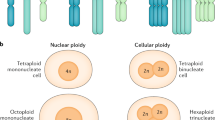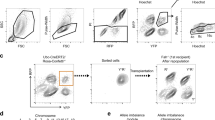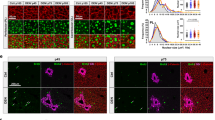Abstract
Nuclear polyploidization in the livers of CF-1 mice, exposed to dieldrin (0, 1, 5 and 10 ppm in the diet), was studied up to the median time of liver tumour development (ranging from 15 to 27 months) in the respective treatment groups. In untreated controls nuclear polyploidization is characterized by a linear increase of octaploid nuclei with age. Approximately 4 months before tumour development a reduction in the tetraploid to diploid ratio is observed. Dieldrin treatment was found to enhance nuclear polyploidization in the initial phases of treatment, as expressed by a dose-dependent increase in octaploid nuclei. In 'steady-state' situations all age dependent changes in the level of polyploidization found in controls were also found in dieldrin treated mice. However, these changes occurred at an increasingly earlier age with higher dieldrin treatment levels. The decrease in the tetraploid:diploid ratio always takes place a few months before tumour development. This change in the ploidy level may thus be related to the subsequent liver tumour formation. The liver tumours themselves appear to originate from a diploid stem line, and were found to increase their degree of polyploidization during growth, eventually developing aneuploid nuclei. A comparison of nuclear polyploidization and liver tumour formation in CF-1 mouse liver for the given dietary dieldrin concentrations showed that liver tumour formation was associated with a constant level of polyploidization. Since polyploidization is an age-dependent process, these findings suggest that liver tumour formation is imminent at a constant biological age and that dieldrin may advance the biological age of CF-1 mouse liver.
This is a preview of subscription content, access via your institution
Access options
Subscribe to this journal
Receive 24 print issues and online access
$259.00 per year
only $10.79 per issue
Buy this article
- Purchase on Springer Link
- Instant access to full article PDF
Prices may be subject to local taxes which are calculated during checkout
Similar content being viewed by others
Author information
Authors and Affiliations
Rights and permissions
About this article
Cite this article
van Ravenzwaay, B., Kunz, W. Quantitative aspects of accelerated nuclear polyploidization and tumour formation in dieldrin treated CF-1 mouse liver. Br J Cancer 58, 52–56 (1988). https://doi.org/10.1038/bjc.1988.160
Issue Date:
DOI: https://doi.org/10.1038/bjc.1988.160
This article is cited by
-
Developmental expression patterns and regulation of connexins in the mouse mammary gland: expression of connexin30 in lactogenesis
Cell and Tissue Research (2005)
-
Dye-coupling in three-dimensional histoculture of rat lingual frenulum
In Vitro Cellular & Developmental Biology - Animal (1995)
-
The stem cells of the liver ? a selective review
Journal of Cancer Research and Clinical Oncology (1992)



